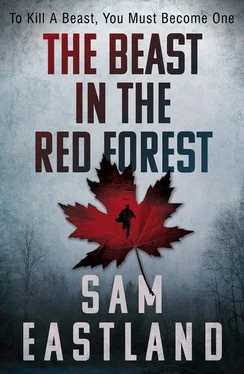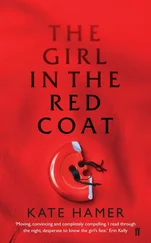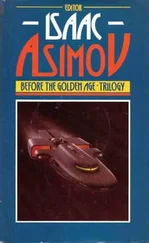Sam Eastland - The Beast in the Red Forest
Здесь есть возможность читать онлайн «Sam Eastland - The Beast in the Red Forest» весь текст электронной книги совершенно бесплатно (целиком полную версию без сокращений). В некоторых случаях можно слушать аудио, скачать через торрент в формате fb2 и присутствует краткое содержание. Год выпуска: 2013, ISBN: 2013, Издательство: Faber & Faber, Жанр: Исторический детектив, на английском языке. Описание произведения, (предисловие) а так же отзывы посетителей доступны на портале библиотеки ЛибКат.
- Название:The Beast in the Red Forest
- Автор:
- Издательство:Faber & Faber
- Жанр:
- Год:2013
- ISBN:9780571281466
- Рейтинг книги:4 / 5. Голосов: 1
-
Избранное:Добавить в избранное
- Отзывы:
-
Ваша оценка:
- 80
- 1
- 2
- 3
- 4
- 5
The Beast in the Red Forest: краткое содержание, описание и аннотация
Предлагаем к чтению аннотацию, описание, краткое содержание или предисловие (зависит от того, что написал сам автор книги «The Beast in the Red Forest»). Если вы не нашли необходимую информацию о книге — напишите в комментариях, мы постараемся отыскать её.
The Beast in the Red Forest — читать онлайн бесплатно полную книгу (весь текст) целиком
Ниже представлен текст книги, разбитый по страницам. Система сохранения места последней прочитанной страницы, позволяет с удобством читать онлайн бесплатно книгу «The Beast in the Red Forest», без необходимости каждый раз заново искать на чём Вы остановились. Поставьте закладку, и сможете в любой момент перейти на страницу, на которой закончили чтение.
Интервал:
Закладка:
‘And you condemned us all to death.’
‘The truth is quite the opposite,’ insisted Pekkala. ‘When I discovered that your father was being held at Lubyanka, I immediately had him transferred to a proper holding cell. There, I interviewed him personally in order to learn the details of the case. I also travelled to Novgorod and spoke to people who had known him at the plant. What they had to say confirmed his story. I wrote up a report, advising that he be repatriated to the United States, along with his entire family. If my instructions had been followed, you and your family would have been back in America long ago. I assumed that’s what had taken place, since my involvement with the case ended there.’
‘My father didn’t reach America,’ said Vasko. ‘He probably never made it out of the country. My mother, my sister and I were arrested outside the American Embassy on her way to apply for a passport to replace the ones which were taken from us when we first arrived in Russia. She was convicted of illegal currency possession and the three of us were exiled to the Gulag at Kolyma.’
‘Kolyma!’ exclaimed Pekkala. ‘And how is it that you survived?’
‘We never arrived,’ explained Vasko. ‘We were shipwrecked off the coast of Japan. I was one of only a few survivors. We were taken to a hospital in Japan, but I suspected that it was only a matter of time before we would be handed over to the Russians, so I escaped. I made my way to the German Embassy. When I explained who I was, they offered to smuggle me out of the country and to give me a new life in Germany.’
‘But why go to the German Embassy?’ asked Pekkala. ‘Why not go to the Americans?’
Vasko shook his head. ‘I didn’t trust them any more than I trusted the Soviets. When I reached Germany, it was admiral Canaris himself who took me in. He trained me. He gave purpose to my life, and I have no regrets for anything I’ve done in the service of the Abwehr.’
‘In spite of that, your mission has failed,’ Pekkala told him. ‘A ceasefire now exists between the men you hoped to turn against each other.’
Slowly Vasko shook his head. ‘It has not failed, Pekkala. All this was only a diversion. The real mission is still under way.’
Pekkala hesitated, wondering whether Vasko might be telling the truth, or if he was just bargaining with lies. ‘If you’re right about what you say, then tell me what you know and I’ll do what I can to protect you.’
‘All I know,’ said Vasko, ‘is that Stalin does not have long to live. Somewhere out there is another agent, and there is nothing you can do to stop him now.’
‘Tell me his name,’ said Pekkala. ‘This might be your only chance to save yourself.’
‘I couldn’t help you, Pekkala, even if I wanted to.’ Vasko spread his arms. ‘So why don’t you just go ahead and shoot?’
‘I have no intention of shooting you,’ Pekkala told him.
‘But you will be the one who hands me over to the men at Lubyanka and when, like my father, I am shot against the prison wall, will your guilt be any less than if you pulled the trigger yourself?’
Pekkala tightened his grip on the Webley. ‘It does not have to end this way,’ he said.
‘No,’ answered Vasko. ‘You could have me shipped me out to Kolyma, and I could end my days in the Sturmovoi goldmine. How long is the life expectancy there? One month? Or is it two? I would rather die here, now, than be led from this place like a lamb to the slaughtering pen.’
‘You know I cannot let you go.’ Sweat burned between Pekkala’s fingers, and his palm felt slick against the pistol grips.
‘Then at least have the courage to kill me yourself.’
‘You are giving me no choice,’ Pekkala answered quietly, as his finger curled around the trigger.
There was no fear in Vasko’s eyes. Instead, he stared Pekkala down, like a man who has foreseen his end a hundred times and for whom the emptiness of death could hold no fear.
Pekkala’s levelled the gun at the inverted V of Vasko’s solar plexus. His breathing grew steady and slow. The muscles in his shoulder tightened in anticipation of the Webley’s kick. Already Pekkala could feel the burden of Vasko’s death hanging like an anchor chain around his neck and he knew that it would never go away.
At that moment, an image flickered in his brain of the journey he had made to the labour camp at Borodok, in a cattle car so crowded that even the dead remained standing. Once more, Pekkala heard the moaning of the wind through barbed wire laced across the window opening and felt the heat of his body leach out through his flimsy prison clothes until his heart felt like a jagged piece of glass lodged in his throat. As that long, slow train clattered through the Ural mountains into Siberia, the knowledge had spread unspoken through those frost-encrusted wagons that even those who might return would never be the same. For the rest of their lives, the mark of the Gulag would be upon them; the unmistakable hollowness of their gaze, the pallor of their cheeks, the way they slept curled in upon themselves, hoarding their last spark of warmth.
While Vasko stood helpless before him, patiently awaiting his death, Pekkala saw the years fade from his face, like layers peeled from an onion, until he glimpsed a child, frightened and confused, and bound on that same journey through Siberia.
As if the weight of his revolver had suddenly become too much to bear, Pekkala lowered the gun. ‘Go,’ he whispered. ‘Find your own way to oblivion.’
Slowly, Vasko’s arms dropped to his side. ‘Is this some kind of trick?’ he asked.
‘Go!’ repeated Pekkala, his voice rising. ‘Before I change my mind!’
A cold wind shuffled through the treetops, sending wisps of fine snow cascading from the branches. Glittering flakes powdered the clothes of the two men, melting in tiny droplets on their skin.
Without another word, Vasko turned and ran.
Pekkala listened to his footsteps fading softly over the pine-needled earth. Then he sighed and put away his gun.
*
The sun had already set by the time Poskrebychev set out for the airfield in an American-made Packard, the personal vehicle of Stalin, which was garaged at the Kremlin Motor Pool. Its original weight of 6000 lb had been increased to 15,000 lb by the addition of armour plating, which included three-inch thick window glass, able to withstand a direct burst of machine gun fire.
Akhatov sat in the back. With a contented groan, he stretched out on to the padded leather seat. ‘Which airfield is it?’ he asked.
‘Krylova,’ replied Poskrebychev and as he spoke he removed an envelope from his chest pocket and tossed it over his shoulder into Akhatov’s lap.
Akhatov tore open the envelope and removed the banknotes it contained. There was a rapid fluttering sound as he let the bills play across his thumb. ‘One thing I’ll say about your boss,’ said Akhatov, tucking the money into his pocket. ‘He pays his debts on time.’
Poskrebychev did not reply. He stared at the road as it unravelled from the darkness, his hands white-knuckled on the wheel.
Soon they had passed beyond the city limits. Stars clustered above the ruffled black line of the horizon.
The gates of the Krylova airfield were open. Tall metal fences, topped with coils of barbed wire, stretched away into the darkness.
‘Why are there no lights?’ said Akhatov.
‘There is a blackout,’ answered Poskrebychev. ‘Military regulations.’ The Packard rolled across the railyard until it arrived at an empty hangar. The brakes squeaked as Poskrebychev brought the car to a halt. ‘We’re a little early,’ he said, cutting the engine. ‘The plane has not yet arrived. You might want to stretch your legs, Comrade Akhatov. You will be on that plane for a while.’
Читать дальшеИнтервал:
Закладка:
Похожие книги на «The Beast in the Red Forest»
Представляем Вашему вниманию похожие книги на «The Beast in the Red Forest» списком для выбора. Мы отобрали схожую по названию и смыслу литературу в надежде предоставить читателям больше вариантов отыскать новые, интересные, ещё непрочитанные произведения.
Обсуждение, отзывы о книге «The Beast in the Red Forest» и просто собственные мнения читателей. Оставьте ваши комментарии, напишите, что Вы думаете о произведении, его смысле или главных героях. Укажите что конкретно понравилось, а что нет, и почему Вы так считаете.











